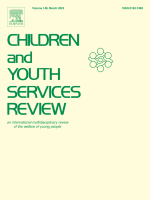Highlights
- Youth in residential youth care (RYC) exhibit significant mental health problems.
- Staff training to foster emotional and mental health in RYC is highly recommended.
- Staff training effectiveness was systematically revised according with PRISMA.
- Few programs addressed staff and youth mental health needs.
- Programs’ effectiveness was not properly tested.
Abstract
Children and youth placed in residential youth care (RYC) exhibit complex emotional needs and significant mental health problems. Better outcomes in RYC have been associated with emotional availability from care workers. Nevertheless, many care workers struggle either with their own mental health and/or with adequately providing support for the mental health problems of youth under their care. Thus, staff training is recommended by international guidelines.
The present study performed a systematic review of research on training programs aiming the fostering of emotional and mental health in RYC, following PRISMA guidelines. A systematic search was conducted in nine digital databases and other sources (websites, relevant journals, reference lists of included articles and relevant reviews), for publications from 1980 to 2021. Empirical studies published in peer-review journals, dissertations, and reports were included when assessing the effectiveness of RYC staff training on fostering emotional and mental health in staff and/or youth.
The methodological quality of included studies was assessed using the Mixed Methods Appraisal Tool. Subsequently, a narrative synthesis was conducted. After multi-stage screening, 18 eligible articles were selected for analysis. One study was excluded considering the quality assessment. Seventeen trainings and their outcomes were analyzed, suggesting mixed evidence of effectiveness on care workers, youth, and relationships. Most programs aimed to reduce youth problematic behaviors, and only a few specifically addressed care workers’ mental health. Findings also suggest that effectiveness was not properly tested in most studies. Future research resorting to rigorous methodologies should be conducted to provide evidence-based interventions for RYC.

